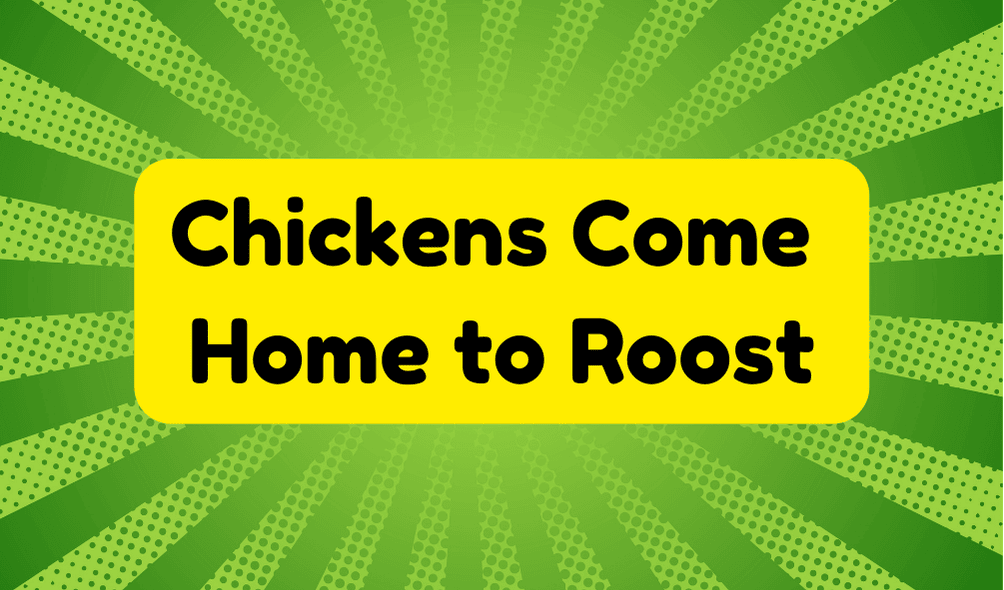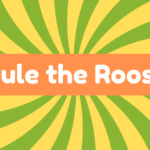The phrase "chickens come home to roost" emphasizes the inevitable consequences of one's actions. Originating from 14th-century literature, it underscores a timeless principle: actions have outcomes, good or bad. For instance, ignoring health advice can lead to severe complications. In today's fast-paced world, accountability is essential, especially with social media magnifying our decisions' repercussions. It serves as a cautionary reminder that neglecting responsibility can have serious effects both personally and professionally. Understanding this concept fosters better decision-making and integrity. To grasp its relevance further, one might explore historical and contemporary examples that illustrate this principle vividly.
Synonyms
Synonyms for the phrase "chickens come home to roost" convey the essential idea of facing the consequences of one's actions. These expressions highlight the significance of consequences awareness and accountability for individual actions, emphasizing that decisions will ultimately lead to outcomes. Understanding this concept is fundamental in steering personal and professional spheres. Key synonyms include:
- What goes around comes around
- You reap what you sow
- Every action has its consequence
- The truth will out
These phrases reflect a universal truth: harmful choices may produce delayed repercussions. As we pursue innovation, being cognizant of the implications of our behaviors promotes responsibility, fostering environments where accountability becomes integral to progress. Embracing this understanding is crucial for any forward-thinking individual.
Example of Sentences
Understanding the implications of the adage "chickens come home to roost" is essential when crafting sentences that illustrate its meaning. These sentences should reflect personal accountability and the inevitable consequences impact one's life. Consider the following examples:
- Years of neglecting financial planning resulted in bankruptcy; the consequences arrived unexpectedly.
- Ignoring health advice led to severe complications; lifestyle choices bore their inevitable impact.
- A company's unethical practices culminated in legal issues; accountability could not be evaded.
- Betraying a trust among colleagues ended in a failed project; personal decisions directly shaped the outcome.
Each of these sentences reinforces the notion that the consequences of our actions will ultimately return, reminding us that personal accountability is paramount in maneuvering life's challenges.
Origin
The phrase "chickens come home to roost" carries a rich historical context that dates back several centuries. Its roots can be traced to 14th-century literary references, particularly by Geoffrey Chaucer in "The Parsons Tale," where themes of retribution emerge. This concept resonates through time, capturing the essence of accountability for one's actions. In the 19th century, Robert Southey's work, "The Curse of Kehama," further popularized the analogy, linking the return of the chickens to consequences faced. Such literary references highlight the inevitability of facing the outcomes of one's choices. Grounded in this historical context, the phrase extends beyond mere words; it serves as a cautionary reminder, urging individuals to recognize and embrace the reality of their decisions.
Collocations
Collocations associated with the phrase "chickens come home to roost" highlight its thematic significance in discussions about consequences and accountability. Understanding these collocations can deepen our awareness of how the consequences of actions play out in various contexts. Significantly, the following phrases often accompany this expression:
- Chickens come home to roost – emphasizing inevitable repercussions.
- Facing the consequences – reinforcing individual responsibility.
- Reap what you sow – indicating the direct link between actions and outcomes.
- Accountability comes knocking – suggesting that one's past actions cannot be ignored forever.
These collocations serve as reminders that individuals must be cognizant of their choices, as the fallout from their decisions tends to manifest over time.
How to Use in Everyday Language
Recognizing the phrase "chickens come home to roost" enhances everyday conversations about accountability and the inevitability of consequences. This idiomatic expression serves as a powerful reminder in various real-life applications, prompting individuals to reflect on their choices and behaviors. Whether discussing corporate ethics or relationships, employing this phrase can foster meaningful dialogue surrounding personal responsibility. Consider using it in scenarios where poor decisions have led to negative outcomes, providing a vivid illustration of action and consequence. However, it is essential to remain aware of its implications; while it encourages accountability, it also invites scrutiny of one's actions. Ultimately, integrating such expressions into daily language enriches conversations and promotes a culture of reflection and growth.
Why Is It Still Relevant Today?
Although society continues to evolve, the phrase "chickens come home to roost" remains profoundly relevant in today's context, underscoring the enduring nature of accountability. In an age characterized by rapid change and innovation, individuals and organizations must recognize that their actions have immediate and long-term consequences today. The pervasive influence of social media amplifies these repercussions, as misdeeds can swiftly come to light, demanding accountability now more than ever. The principle serves as a stark reminder that neglecting responsibility can lead to dire outcomes, both personally and professionally. As we navigate complex dilemmas, the wisdom of this phrase encourages a critical examination of our choices, fostering a culture where integrity and foresight are essential for sustainable success.






